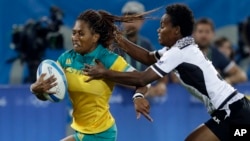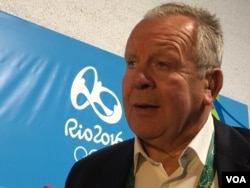“It's been a game-changer.”
That's how World Rugby Chairman Bill Beaumont, a former English player, describes the inclusion of rugby in the 2016 Rio Olympics.
Through the years, the governing bodies of many international sports that are not represented in the Olympics have lobbied for inclusion. Rugby and golf, which had not been in the Olympics since the early 1900s, returned this year after a long absence.
The last time rugby was part of the Summer Games was in 1924, when the United States men won a gold medal in the 15-a-side version of the sport. In Rio, both men's and women's teams are playing rugby sevens — seven players on each side.
The U.S. men's and women's teams both qualified in the 12-nation draws for the six-day tournament in Rio.
Beaumont noted that some of the top players who compete in 15-a-side rugby did not make their countries' sevens teams for the Olympics, but he believes new stars will emerge in Rio.
Fans can get close
The World Rugby Organization's chief executive, Australian Brett Gosper, said ticket sales for Olympic rugby have been good, and that those attending matches in Rio are in for a good sporting experience.
“We think it's brilliantly designed, the stadium we have, for spectators. What's great about sevens rugby is when the fans can be very close. It sounds obvious, but the closer they are to the players, the better the atmosphere,” said Gosper.
Beaumont told reporters it is critical having women playing at these Olympics as well as the men. “This is a fantastic opportunity to showcase the game, and I think it will be the biggest kick-start that the game of rugby has had, and especially for the women and girls.”
“I think for the growth of the women's game, sevens provides one of the greatest opportunities that we have,” said Irishman Mark Egan, World Rugby's head of competitions and performance. “It's a very attractive form of the game for young girls, and I think when people all around the world and women see the sport on TV in the Olympic coverage, I think there's going to be a huge upsurge of interest.”
“As an organization, we are looking to expand sensibly where we can get sustainable growth in the game,” added Beaumont, “and it's sustainable that we want. We want to be here in Brazil in 10 years' time, and say this is a great game and the 2016 Olympics was the catalyst to establish the game in this country.”
Social media, ticket sales
Gosper addressed what he believes it will take for rugby to remain an Olympic sport.
“There's a vast number of criteria that all Olympic sports are trying to hit in determining the success they have at the games,” he said. “What really is important is the fill of the stadiums, the impact you have on social media, broadcast ratings in key Olympic markets. The atmosphere in the stadium is very important. I think volume of ticket sales is also one of the criteria.”
Gosper believes rugby will score well in all of those areas.
Baseball and softball, added to the 1996 Atlanta Olympics, were dropped from the London Games four years ago. However, they will return for the Tokyo Games in 2020.
The International Olympic Committee also voted this week to add competitions in karate, sport climbing, skateboarding and surfing. It was viewed as an effort to continue to attract young people and to reflect “the trend of urbanization of sport.”







